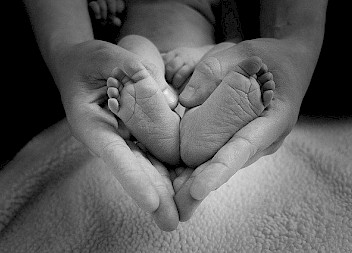What Is a Negligence Claim for a Stillbirth?
Stillbirth is where a baby dies in the womb after 24 weeks of gestation; they are born without any signs of life - no heartbeat, no breath taken. Discover more about what a stillbirth is.
A negligence claim for a stillbirth is a type of medical negligence or personal injury claim typically brought by parents when a stillbirth occurs as a result of medical professionals to meet the right standard of care during pregnancy, labour, or birth delivery.
Discover more about birth injury claims.
What Are Examples of Stillbirth Negligence?
Not all stillbirths are preventable, and a large proportion occur in seemingly healthy babies. However, in the UK, around one in 250 babies are stillborn because of trauma or an event that was not well-managed or anticipated.
Common examples of stillbirth caused by negligence include:
- Failure to act on reduced movements
Pregnant mothers should not be ignored or told not to worry if they experience a reduction in antenatal movements. Midwifery teams should monitor the baby in utero.
- Failure to adequately monitor the baby in the hospital
Particularly lack of foetal heart rate monitoring or incorrect interpretation of cardiotocography (CTG).
- Failure to identify growth restrictions
If it is presumed during regular antenatal check-ups that foetal growth has trailed off or slowed down, the mother should be regularly monitored and assessed with growth scans. Sometimes, there is a failure to measure the fundal height (the vertical height of your pregnancy belly), or measurements are incorrectly plotted on the growth chart, which can result in misdiagnosis. Towards the end of pregnancy, the only way to safely deal with growth restrictions is to induce labour and deliver the baby.
- Failure to detect placental abruption
If a pregnant woman is presenting pain (and possibly bleeding) caused by the placenta pulling away from the womb, there may be a failure to recognise these as signs of placental abruption, resulting in a delay in providing adequate care for her and her unborn child. There may also be a failure to recognise the risks of abruption, such as pre-eclampsia or growth restrictions.
- Failure to treat Group B Strep
This is a common bacterial infection found in the vagina and is normally harmless. But if it spreads to the baby during vaginal delivery, it can make them seriously ill. In some cases, it can be fatal. If Group B Strep is suspected, antibiotics should be given before labour. There may be a delay or total failure to administer this, or results may not be followed up after birth.
- Mismanagement of high-risk mothers
Mothers over 40, who have conceived via IVF or with conditions such as diabetes and pre-eclampsia, should be closely monitored throughout their pregnancy. Often, they should not be allowed to reach 40 weeks before delivering their baby, due to an increased risk of stillbirth after 37 weeks.
Stillbirth Compensation Claims Process
Making a stillbirth claim can be emotionally challenging, which is why our team are here to support you every step of the way. Before making a claim, you need to know if you are eligible to do so. You may be able to make a stillbirth compensation claim if your medical professional:
- Failed to identify and treat pregnancy complications, such as infections
- Ignored signs of foetal distress or reduced movement and failed to act accordingly
- Provided inadequate prenatal monitoring or failed to refer you for specialist care when needed
- Made errors or delays during delivery
After determining your eligibility, you can submit a claim to us and start with a free consultation. A member of our expert team will discuss the following with you:
- Whether you have a valid stillbirth claim
- The extent of your suffering as a result of stillbirth medical negligence
- Any necessary details and documentation we need to move forwards in the claims process
- How Medical Solicitors will handle your stillbirth claim
- The amount of stillbirth compensation you could win
- How the Conditional Fee Agreement works
Post-consultation, our stillbirth claim solicitors will start to gather evidence to support your case. We know navigating the claims process can be difficult, so please get in contact with us to discuss your circumstances further.
Browse our case studies in this area to see how we handle the process for you:
£300,000 to a Woman for the Stillbirth of Her Baby
£120,000 for a Woman After the Stillbirth of Her Unborn Child
£100,000 to Mum of Wrongly Presumed Stillborn Baby
Start a Conversation about Your Stillbirth Compensation Claim Today
Our team has more than three decades of experience dealing with stillbirth negligence claims in the UK. We work to do everything we can to achieve the compensation our clients deserve and ensure they understand what medical negligence is.
If you think you have been impacted by damages for stillbirth, please get in touch with our friendly team of specialist lawyers to start a conversation about the claims process. Most of our claims are conducted under conditional fee agreements, so you don’t have to worry about how you will fund a claim. You have nothing to lose by contacting us about your stillbirth claim.








